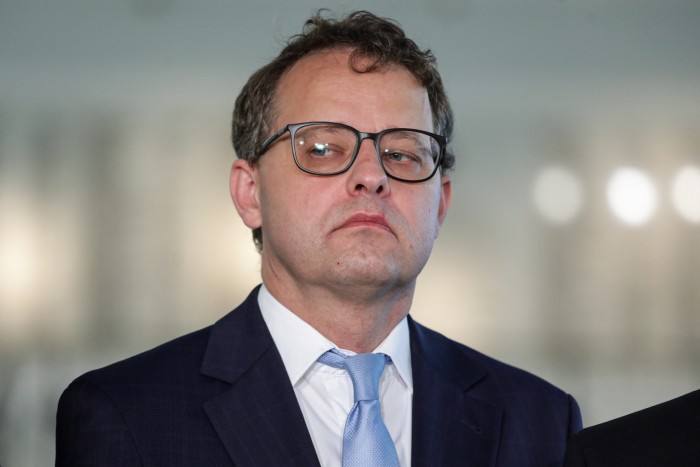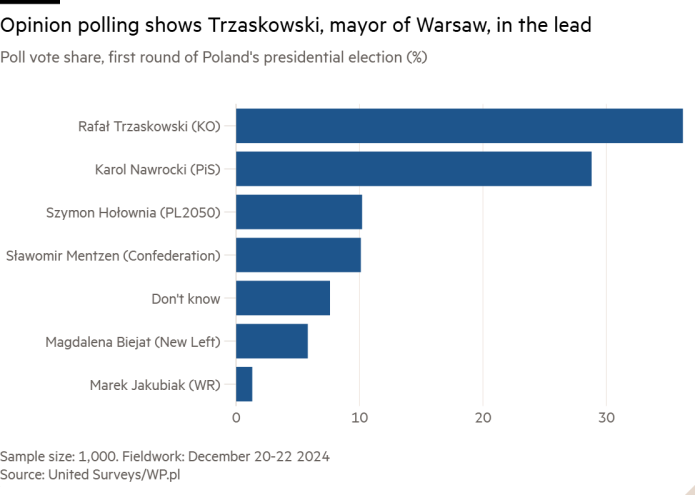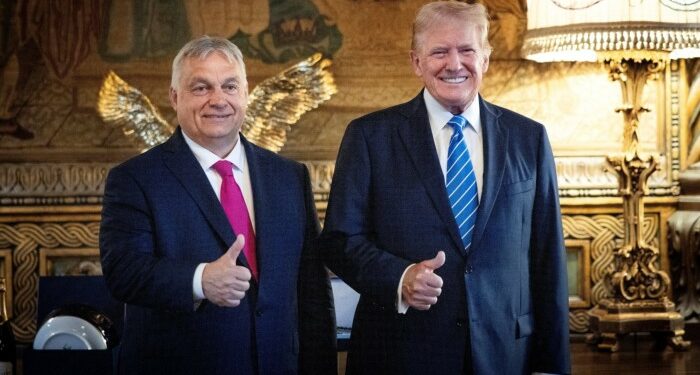The longer Hungary’s economic troubles persist, the higher the chances that public support will continue to grow for opposition leader Péter Magyar and his upstart Tisza party.
Despite these rebukes and headwinds, Orbán gave the strong impression at an end-of-year news conference that he thinks the tide of international affairs is, overall, flowing in his direction.
His evidence? First, Trump’s election victory. Second, the strength of like-minded political forces in countries such as Austria, France, Italy, the Netherlands and Slovakia.
As Orbán put it:
“I am convinced that the US election result is in line with the change in European politics that we have helped to bring about.”
For all his complaints about the EU, it was striking that Orbán devoted much of his news conference to the argument that Hungary’s presidency had actually been good for the 27-nation bloc.
He cited three achievements: the inclusion, at long last, of Bulgaria and Romania in the EU’s border-free Schengen travel zone; the promotion of an economic competitiveness agenda; and progress in discussions over how to fund EU agriculture.
His remarks demonstrated that Orbán has no interest in “Hungexit” — Hungary’s withdrawal from the EU. Rather, he hopes to transform the bloc from within, in co-operation with fellow rightwing populists around Europe.
Orbán and Trump: not such firm buddies?
I cannot help wondering if, once Trump is back in the White House, it may turn out that Orbán’s friendship with the new president is built on less than solid foundations.
One issue is the level of defence spending by Nato’s European members, which include Hungary. The Europeans are bracing themselves for a demand from Trump to raise defence expenditure well beyond the 2 per cent of GDP target that Nato set in 2014.
Unlike some alliance members, Hungary has met that goal, but here’s what Orbán had to say at his news conference about a possible higher target:
“If the 2 per cent has to be increased, that would shoot the Hungarian economy in the lungs.”
Another issue is Hungary’s close relations with China, which Xi described last year as an “all-weather comprehensive strategic partnership”.
Orbán’s cultivation of Beijing would appear to fit not at all well with the more robust stance that Trump is expected to adopt towards China, and to request from Washington’s European allies, on economic and security matters.
Poland and Trump
By contrast, Poland’s defence and security policies seem to chime nicely with Trump’s inclinations. Poland plans to spend 4.7 per cent of GDP on defence this year — the highest proportion of all Nato countries — and intends to use its six-month EU presidency to press for a stronger collective European approach to the alliance’s security.
 Polish and American soldiers stand near their armoured vehicles during Defender Europe 2022 military exercise of Nato troops, May 2022 © Kacper Pempel/Reuters
Polish and American soldiers stand near their armoured vehicles during Defender Europe 2022 military exercise of Nato troops, May 2022 © Kacper Pempel/Reuters
That said, it won’t all be sweetness and light between Warsaw and the incoming US administration. More than most European countries, Poland got on well with Trump in his first term partly because it was governed at that time by the conservative nationalist Law and Justice (PiS) party.
As Aleks Szczerbiak, politics professor at the UK’s University of Sussex, points out, it is awkward that Radek Sikorski, foreign minister in Poland’s new liberal centrist government, once called Trump a “proto-fascist”.
(A similar problem arises in the UK, whose foreign secretary, David Lammy, denounced Trump in 2018 as a “woman-hating, neo-Nazi-sympathising sociopath”.)
However, Szczerbiak argues — correctly, in my view — that there will not be a collapse in US-Polish relations after Trump takes office:
Warsaw and Washington have ongoing common geopolitical interests and there is still plenty of scope for the two countries to work together closely. Polish-US strategic co-operation is deeply rooted, and Trump has frequently referred to Poland as an example of a loyal ally.
Warsaw at odds with Budapest
In fact, there’s a good case that Poland will have more amicable relations with the US than with Hungary.
In a serious diplomatic incident that erupted before Christmas, Orbán’s government granted asylum to Marcin Romanowski, a PiS member of parliament and former junior minister. The Polish authorities have issued an arrest warrant for Romanowski for alleged fraud.
 Hungary granted Marcin Romanowski (pictured) protection because of the ‘direct interference and influence of politicians from the current ruling majority in Poland on the ongoing investigation’, Romanowski’s lawyer Bartosz Lewandowski said. © Tomasz Gzell/EPA/Shutterstock
Hungary granted Marcin Romanowski (pictured) protection because of the ‘direct interference and influence of politicians from the current ruling majority in Poland on the ongoing investigation’, Romanowski’s lawyer Bartosz Lewandowski said. © Tomasz Gzell/EPA/Shutterstock
Perhaps this episode shouldn’t have caused surprise. In 2018, Nikola Gruevski, a former prime minister of North Macedonia who was due to serve a prison sentence for corruption, was smuggled to Budapest with the help of Hungary’s authorities.
Poland’s high-stakes presidential election
In most respects, Poland’s EU presidency will represent a return to business as usual after the frictions during Hungary’s six-month term.
To some extent, however, domestic politics will cast a shadow over Poland’s spell in charge. The presidential election scheduled for May will be the next set-piece battle between the liberal internationalism embodied by Prime Minister Donald Tusk’s government and the rightwing nationalism of PiS.

The stakes could hardly be higher, as explained by Andrzej Bobiński of Polityka Insight, a think-tank in Warsaw. Either PiS will be “on a highway to return to power — or it will be the end of PiS as we know it”, he says.
The Tusk government, determined to win the presidential contest, will not want to play into the hands of PiS by adopting positions on European issues that risk making it look as if it isn’t sticking up for Poland’s interests.
One such issue is climate change. Another is Poland’s relations with Germany, which remain tepid despite the Tusk government’s efforts to calm the severe tensions of PiS’s 2015-2023 spell in power.
Piotr Buras, head of the European Council on Foreign Relations think-tank in Warsaw, sets out Tusk’s problem:
He is the one who faces accusations [from PiS] that he is too pro-German, so he needs to make himself more credible to Polish public opinion by being tough on Germany.
Implications of a Ukraine ceasefire
Finally, a few thoughts on Trump and the Ukraine war. What will be the fallout for Hungary and Poland, if Trump forces a ceasefire that leaves Russia in control of the roughly 20 per cent of Ukrainian territory that it presently holds?
Orbán would surely celebrate such an outcome as a vindication of his long-standing insistence that the war should end quickly.
For Poland, any ceasefire along these lines would be unwelcome to Tusk’s government. But it could inflict more damage on PiS and hurt its prospects of winning the presidential election.
PiS has consistently contended that, because of its ideological affinity with Trump, it can do a better job than Tusk’s government of protecting Poland’s interests.
But that argument would be undermined by a ceasefire that appeared to leave Russia with the upper hand in Ukraine.
The rise of opposition leader Péter Magyar and the future of Hungary’s illiberal state — an analysis by Miklós Kis for the Heinrich Böll Stiftung
Tony’s picks of the week
Climate change is redrawing the wine map of Europe as viticulture expands into countries such as Denmark once considered too cold, the FT’s Susannah Savage reports
Allegations that Russia interfered in Romania’s presidential elections are under scrutiny after a liberal Romanian political party was reported to have fuelled a TikTok campaign that affected the vote, according to bne IntelliNews
Recommended newsletters for you
Trade Secrets — A must-read on the changing face of international trade and globalisation. Sign up here
Chris Giles on Central Banks — Vital news and views on what central banks are thinking, inflation, interest rates and money. Sign up here
Source link : http://www.bing.com/news/apiclick.aspx?ref=FexRss&aid=&tid=677ac9d70b784f12b916750e269535fe&url=https%3A%2F%2Fwww.ft.com%2Fcontent%2F81e2c181-a246-4774-94c3-95c8802b733f&c=15751506694048472781&mkt=de-de
Author :
Publish date : 2025-01-04 03:00:00
Copyright for syndicated content belongs to the linked Source.


